Activity
The Power of Inquiry
Are thoughts always true? Do we have to believe everything we think? In this activity, your child will use two powerful questions to investigate a thought and the truth behind it: Is it true? How do you know it is true? After being guided through a mindful breathing session, your child will write and perform a skit using mindfulness and these important questions. Geared toward fourth and fifth graders, this activity can help learners develop important social emotional skills around self-awareness, problem-solving, and empathy.
What You Need:
- Skit: Is it True? worksheet
- Crayons
What You Do:
- Ask your child to come into a mindful body and take a few deep breaths into their belly. Tell them to visualize a friendly animal (e.g. a puppy) breathing in and out.
- Guide your child to breathe naturally. As they breathe, ask them to notice their breath at one point on their body (at their nose, throat, belly, etc.).
- As your child holds their attention at one point, mention to them that it is normal if their mind wanders. If it does, patiently ask them to slowly bring their attention back to their breath.
- Tell your child that they can use labels when they notice a thought. In their mind, they can notice the thought and label it as "Thinking...thinking..." Then, they should gently come back to the feeling of their breath.
- Pause, and allow your child to practice this for 2–3 minutes.
- Afterwards, guide them to take one more full breath into their belly and exhale. Ask them to slowly open their eyes when they are ready.
- Ask your child what they noticed and how they feel. Did they notice thoughts rising in their mind? Were they able to label their thoughts as "Thinking...thinking..."?
- Explain to your child that there is never anything wrong with thinking, and that having thoughts is completely normal.
- Ask your child if everything we think is always true. Explain that not everything we think is true, and most of the time our thoughts are not correct.
- Write down the following two questions that we can use when investigating thoughts: Is it true? How do you know it is true?
- Give your child an example of a thought you have had. For example, you can say, "My friend never listens to me."
- Move through the two questions one at a time, using your thought. First ask, "Is it true?" Then respond, "Well, kind of..."
- Next, ask "How do you know it is true?" Respond, "I guess, sometimes they listen to me. They aren't always like this. There are times when they do listen."
- Share with your child the "Man on the Subway" story from Steven Covey: "One Sunday morning I was on a subway in New York. People were sitting quietly – some reading newspapers, some lost in thought, some resting with their eyes closed. It was a calm, peaceful scene. Then suddenly, a man and his children entered the subway car. The children were so loud and rambunctious that instantly the whole climate changed. The man sat down next to me and closed his eyes, apparently oblivious to the situation. The children were yelling back and forth, throwing things, even grabbing people’s papers. It was very disturbing. And yet, the man sitting next to me did nothing. It was difficult not to feel irritated. I could not believe that he could be so insensitive as to let his children run wild like that and do nothing about it, taking no responsibility at all. It was easy to see that everyone else on the subway felt irritated, too. So finally, with what I felt like was unusual patience and restraint, I turned to him and said, 'Sir, your children are really disturbing a lot of people. I wonder if you could control them a little more?' The man lifted his gaze as if to come to a consciousness of the situation for the first time and said softly, 'Oh, you’re right. I guess I should do something about it. We just came from the hospital where their mother died about an hour ago. I don’t know what to think, and I guess they don’t know how to handle it either.' Can you imagine what I felt at that moment? My paradigm shifted. Suddenly I saw things differently, and because I saw differently, I thought differently, I felt differently, I behaved differently. My irritation vanished. I didn’t have to worry about controlling my attitude or my behavior; my heart was filled with the man’s pain. Feelings of sympathy and compassion flowed freely. 'Your wife just died? Oh I’m so sorry! Can you tell me about it? What can I do to help?' Everything changed in an instant.”
- Have your child share what they learned from the story in relation to the two questions "Is it true?" and "How do you know it's true?"
- Move through the Skit: Is it True? worksheet with your child, using the two questions to investigate whether they must believe a particular thought.
Related learning resources
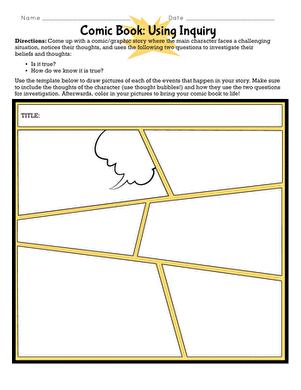
Comic Book: Using Inquiry
Worksheet
Comic Book: Using Inquiry
Using this worksheet as a guide, students will create a comic book to show how using inquiry can help them practice kindness and compassion toward themselves and others.
4th Grade
Worksheet

I Got The Power!
Lesson plan
I Got The Power!
Do your students understand the power of 10?
5th Grade
Math
Lesson plan

The Power of Persuasion
Lesson plan
The Power of Persuasion
Teach your students the power of persuasion by preparing them to write persuasive letters. This lesson, complete with brainstorming activities, allows young writers to unlock their inner rhetoricians.
5th Grade
Lesson plan
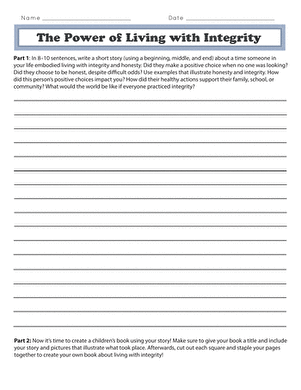
The Power of Living with Integrity
Worksheet
The Power of Living with Integrity
Help your child write a children’s book about the power of living with integrity!
4th Grade
Worksheet
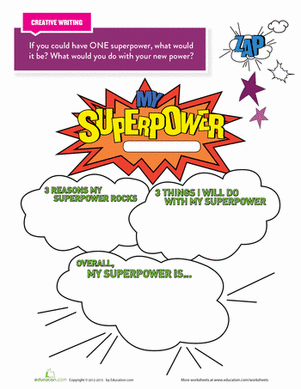
My Super Power
Worksheet
My Super Power
If you could be a superhero, what power would you want to have?
4th Grade
Worksheet
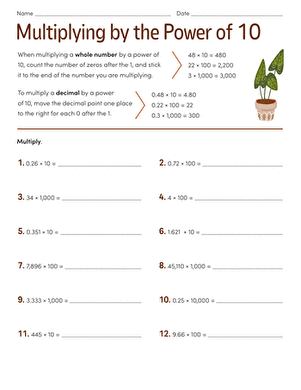
Multiplying by the Power of 10
Interactive Worksheet
Multiplying by the Power of 10
Learn the rules for multiplying whole numbers and decimals by powers of 10 in this math worksheet!
Interactive Worksheet
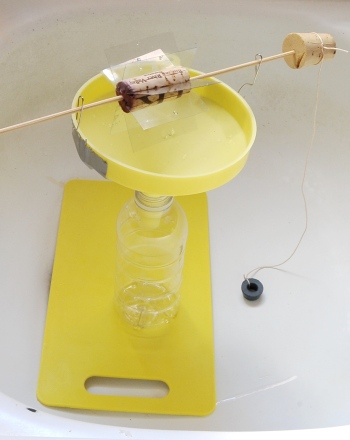
Renewable Energy Project for Kids: Power from Water
Activity
Renewable Energy Project for Kids: Power from Water
Kids learn about potential energy, and mechanical energy, and how to make power from water with one of our favorite renewable energy projects for kids.
5th Grade
Science
Activity
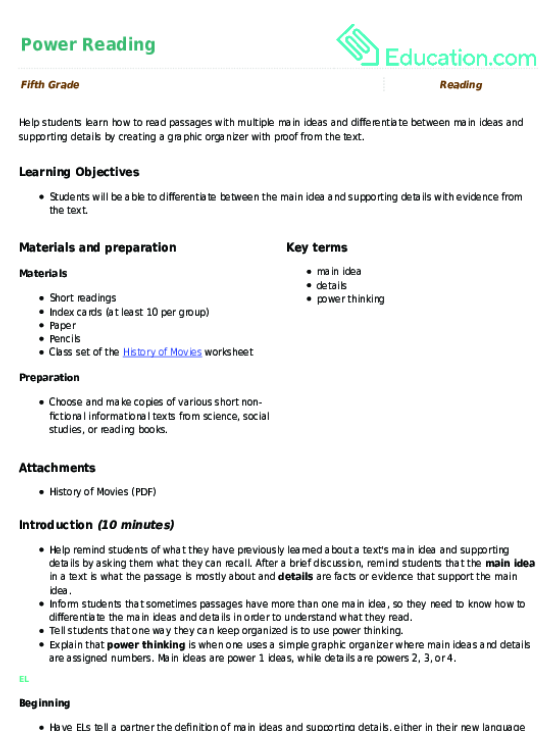
Power Reading
Lesson plan
Power Reading
Help students learn how to read passages with multiple main ideas and differentiate between main ideas and supporting details by creating a graphic organizer with proof from the text.
5th Grade
Lesson plan
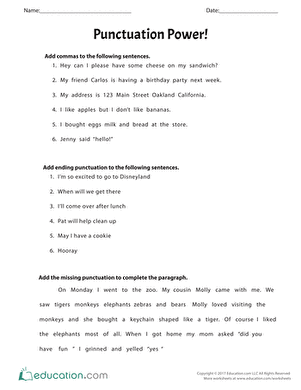
Punctuation Power!
Worksheet
Punctuation Power!
Kids practice commas and ending punctuation with this worksheet.
5th Grade
Worksheet

Making Judgements: Is it True?
Lesson plan
Making Judgements: Is it True?
In this lesson, students will engage in inquiry, a powerful mindfulness practice to work with judgements about oneself and others.
4th Grade
Lesson plan

Power Play: Exponents and Equations
Workbook
Power Play: Exponents and Equations
This workbook offers plenty of hands-on practice so that students can
Workbook
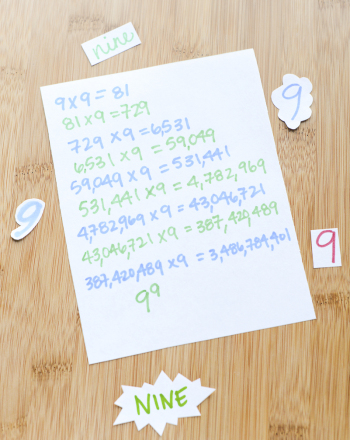
Nine: The Biggest Little Number
Activity
Nine: The Biggest Little Number
Learn about the power of exponents. The objective of this science fair project is to explore and understand how exponents are used.
5th Grade
Science
Activity



